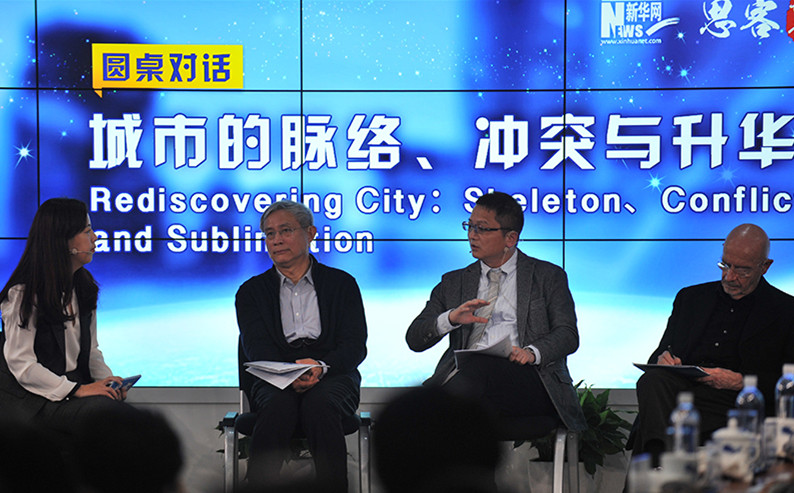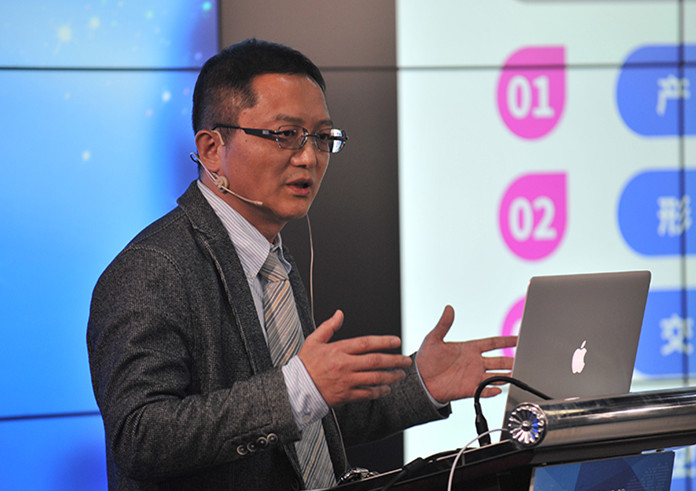Seminar explores next stage for China's urbanization
- By Wu Qiongjing & Zhang Rui
 0 Comment(s)
0 Comment(s) Print
Print E-mail China.org.cn, December 17, 2015
E-mail China.org.cn, December 17, 2015
|
|
| A seminar held in Beijing on Monday focuses on exploring urban construction and planning, tackling problems in China's urban development and finding out the next step for China's urbanization. [Photo / China.org.cn] |
A seminar held in Beijing on Monday focused on exploring urban construction and planning, tackling problems in China's urban development and finding out the next step for China's urbanization.
The seminar on "Rediscovering City: Continuity, Conflict and Sublimation," hosted by Thinker Class, was attended by Zhou Muzhi, professor at Tokyo Keizai University, Mario Bellini, the renowned Italian architect, and Zhou Qiren, professor at Peking University’s National School of Development.
"Our city is actually in a sub-standard state of health," said Professor Zhou Muzhi.
Over the last stage of urbanization, cities have been growing at an alarming pace, but the quality of living and life of urban citizens is still far from reaching the desired level. Congestion, haze and a series of "urban diseases" have ensued, and such problems as local financial shortage, the widening income gap between urban and rural areas is persisting. "China's urbanization has featured a 'barbaric growth,' which results in a 'low-density' expansion." Zhou said.
Professor Zhou Qiren from the National School of Development at Peking University shared Zhou Muzhi's view. He revealed the status quo of how Chinese cities are ahead of "construction" by citing the metaphor that "the cups are plenty, but the water is scant – there isn’t enough to go around." As suggested by Zhou Qiren, concepts, interests and habits are the causes of the "pie" phenomenon in urban construction.
|
|
|
Professor Zhou Muzhi of Tokyo Keizai University speaks at a seminar held in Beijing on Dec. 14, 2015 which focuses on exploring urban construction and planning and finding out the next step for China's urbanization. [Photo / China.org.cn] |
In exploring how to eliminate financial dependence on land, and kick-start the next stage of China's urban construction, Zhou pointed out that the next step should be to develop compact cities and increase the density of existing cities by enhancing their bearing force. "We should take gathering as the priority, population as a main concern, and convenience as an important factor. In doing so, it's necessary to change concepts and strategies, make further use of market mechanisms, and introduce more local forces," he said.
Mario Bellini, the well-known Italian architectural designer, dwelled on the issues of urban planning and habitat improvement from a designer's perspective. In his view, a town is the most livable model, where people can get close to nature, integrate into the community, enjoy a variety of amenities within walking distance and have a high sense of belonging. At the same time, he suggested that a city's development should not merely construct new buildings blindly, but build the city on the basis of its history and preserve its traditions. "When we build a city, we should not only think of the development from a purely economic and functional point of view," Mario Bellini argued. "In Europe, many cities with thousands of years of history are not planned out, but are instead the result of people’s choices together with history."
For Zhou Muzhi, urbanization, it seems, is a process of the "straw effect," in which the city's main concern for future development should lie in attracting human, financial and material resources so as to make the city bigger and stronger. He also pointed out that traffic congestion, air pollution and a series of "urban diseases" have brought about excessive tension and pressure on city dwellers. China's urbanization in the next stage should strive for a higher standard of quality, increase a city’s density, enrich a city's functions, define boundaries and avoid unlimited urban sprawl.
Zhou Muzhi also proposed that the current problems of urbanization stem from the absence of a defined system, rather than a technical vacancy. He advocated a modular approach to new urbanization.
Professor Zhou Muzhi believes that a comprehensive approach is more effective than technology in coping with the many problems that arise in cities. Thus, he proposes a new approach to "new urbanization" – the "Modular City." Under such a design, the city is divided into a number of "modular regions" that are mixed by their various functions, including zones for residence, work, business, recreation, education, and medical care. Public transportation, communication, energy, greenway and waterway "city networks" connect all the modular regions of a city organically into a whole. Each modular region develops its own distinctive characteristics for its main functions. The concept of the "Modular City" represents Professor Zhou Muzhi's efforts in upgrading Chinese cities.
The seminar was jointly hosted by Thinker Class of Xinhuanet, Cloud River Urban Research Institute, and the Doctor Forum of the National School of Development at Peking University.








Go to Forum >>0 Comment(s)